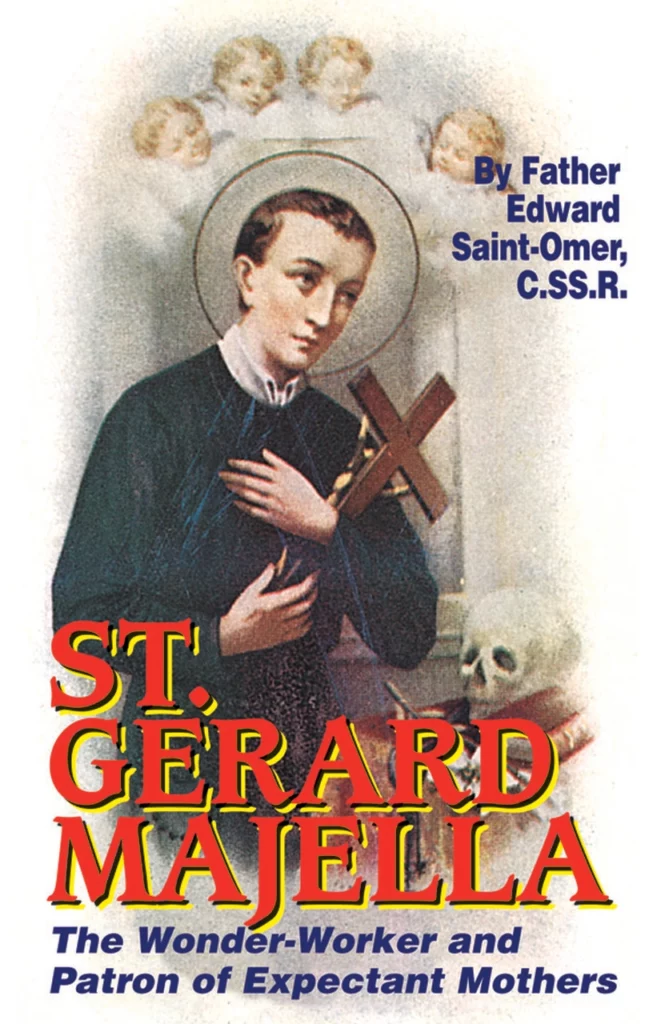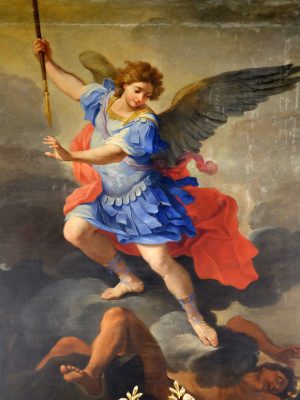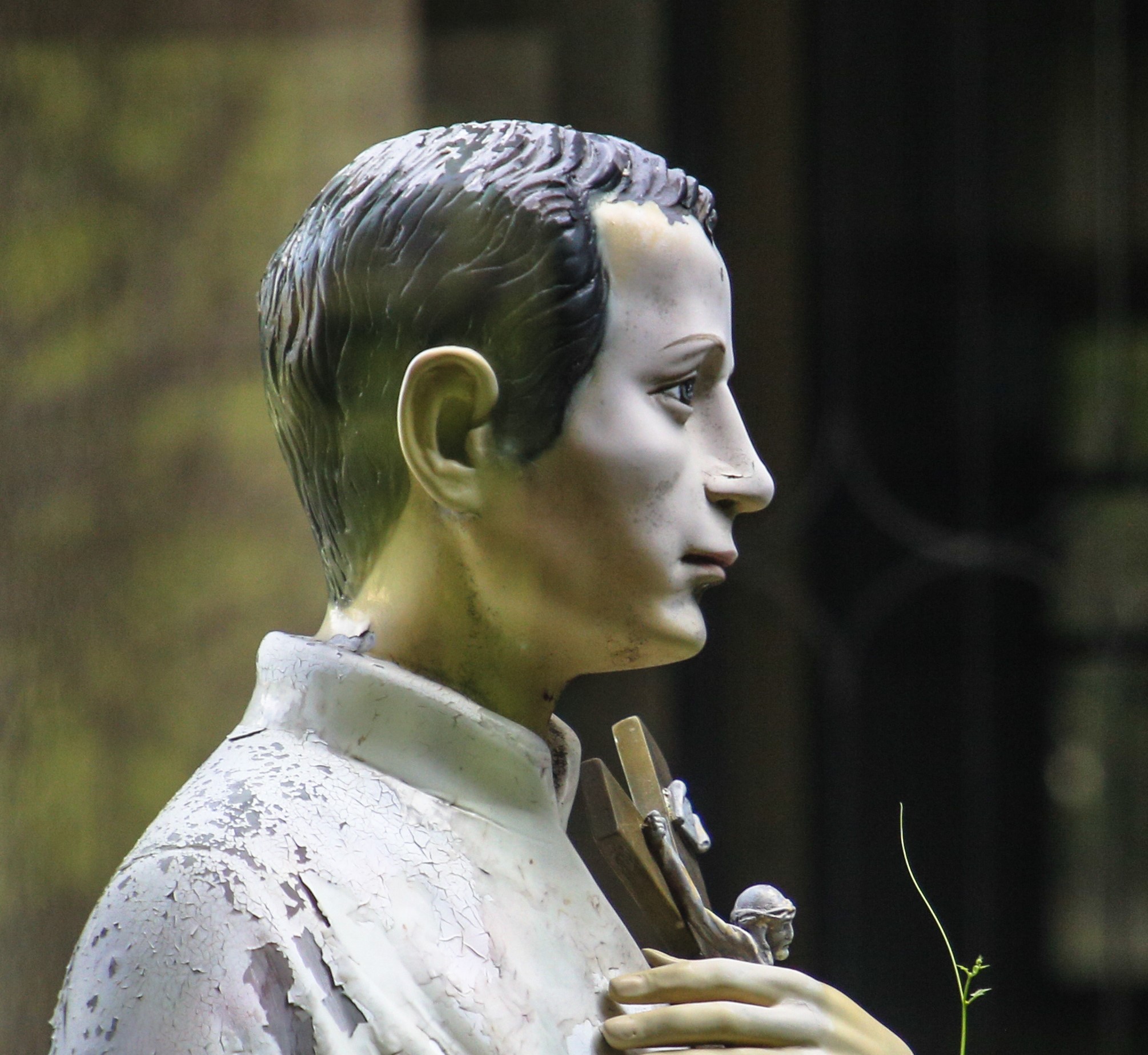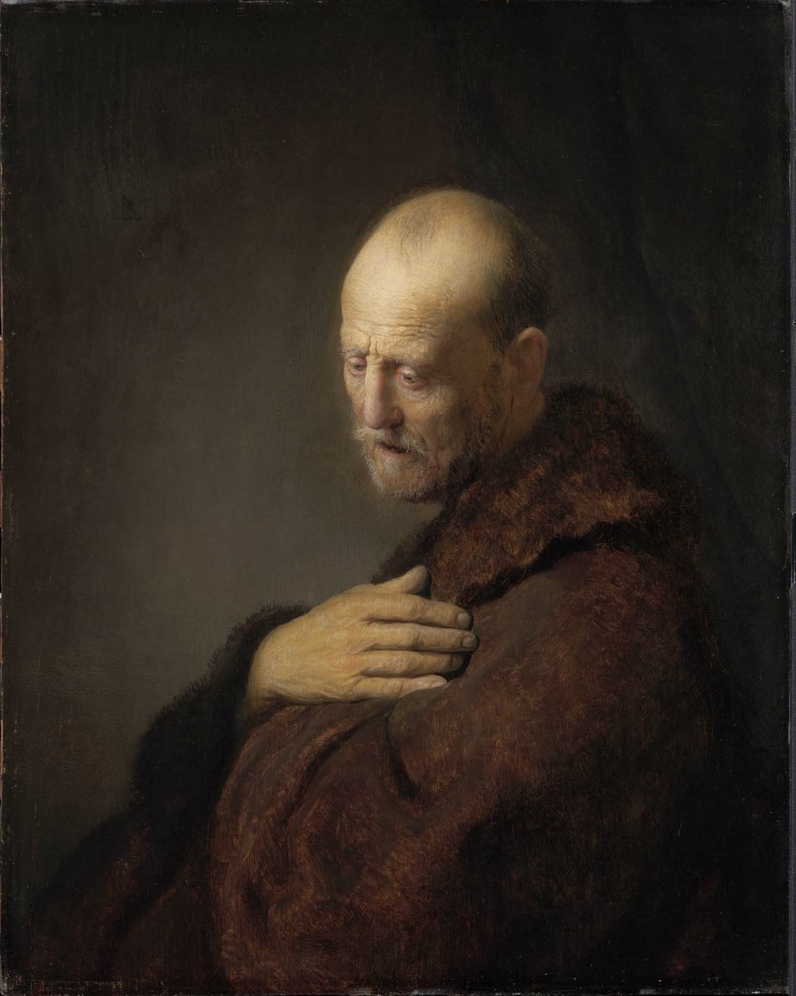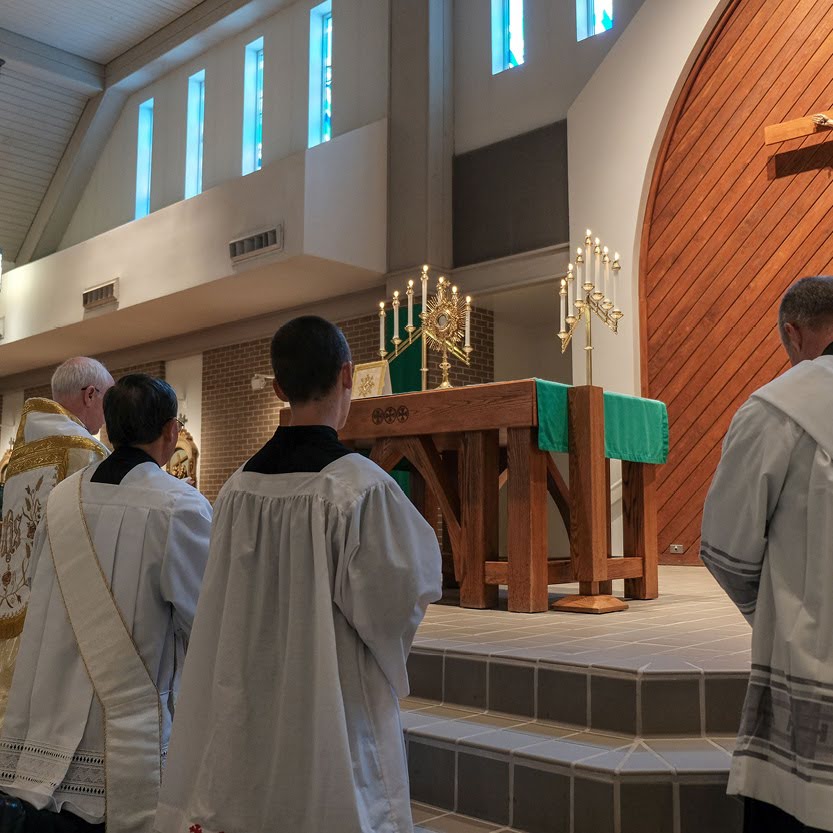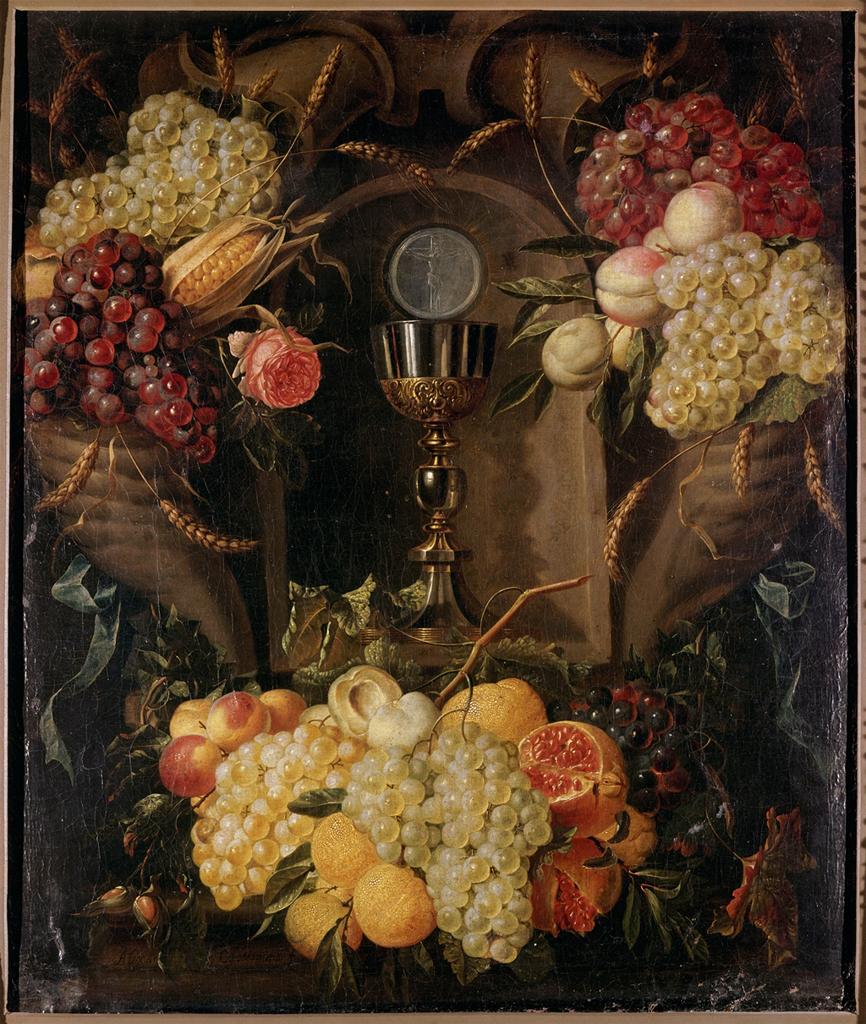A child of Heaven rather than of earth, Gerard had chosen his intimate friends from among the Angels and the Saints. Besides the Twelve Apostles, he daily honored his Guardian Angel, St. Joseph, Sts. Joachim and Anne, St. John the Baptist, St. Bernard, St. Philip Neri, St. Mary Magdalen the Penitent, St. Francis Xavier, St. Teresa, St. Francis of Assisi, St. Felix Cantalice, the Forty Martyrs, the Saint of his birthday, and also the Saint of the day on which he was to die. But nothing equalled his tender devotion to the Archangel Michael, who lavished on him so many privileged favors during the course of his life.
The young Redemptorists who studied theology at Iliceto obtained permission to visit, during the vacation of September, 1753, the celebrated grotto of the Archangel on Mount Gargano, and Brother Gerard was appointed to take charge of them. It was a great satisfaction for this pious brother to be able to present in person his homage to his celestial protector. Our pilgrims received only twenty carlins (12 francs, 50 centimes; or less than 3 dollars) for the journey, although they numbered not fewer than twelve persons and the pilgrimage would last nine days.
To the students’ remarks on the smallness of the sum, Gerard replied, “God will provide.” A hermit undertook to accompany them with two rented donkeys. On passing by Foggia, they went to venerate the miraculous picture of the Blessed Virgin, before which St. Alphonsus had been twice publicly favored with an ecstasy.
A religious of the Annunciation wished to take advantage of the saintly brother’s presence to confer with him on the state of her soul, but what was her surprise when the man of God told her to prepare to quit this earth at once. This news was so much the more unexpected to the sister since she was in the flower of her age and in full health. The sequel, however, soon proved the truth of the prophecy.
During all this journey, Gerard did not cease to show his confidence in God. Seeing the young people worn out by fatigue, he rented a wagon. “But how shall we pay for it?” they said to him. “God will provide,” responded the holy brother. And now the two donkeys refused to go forward.
The hermit, losing patience, wanted to leave them at a public-house till their return. “I take upon myself to make them go on,” said Gerard, smiling, and touching them with his stick, he said, “In the name of the Most Holy Trinity, go on! I order you!” The poor beasts immediately stepped out at a quick pace, which they kept up the rest of the journey.
When they reached Manfredonia, the purse contained only one franc. Far from losing confidence, Gerard, seeing a beautiful bouquet for sale, bought it, took it to the church and, placing it before the Tabernacle, said to Jesus Christ: “See, Lord, I have been thinking of Thee. Do Thou deign to think of my little family.” The chaplain of the chateau, a witness of this act of devotion, called the devout servant of Christ and begged him and all his companions to accept his hospitality.
“May God be your reward,” replied Gerard, “but there are too many of us!” “Never mind that. Let all come. I regret only one thing, and that is, that my mother, who has been ill for two months, cannot receive you as you deserve.”
“There is a remedy for her sickness,” replied the brother. “Make a Sign of the Cross on the forehead of the sick woman, and she will be cured.” And indeed, hardly had she been signed with the Cross when she was perfectly restored. The devotion of the holy Redemptorist to the Blessed Sacrament made such an impression on another priest of the place that he presented him a beautiful silver censer.
Next day, our travellers continued their route toward Mount Gargano. Gerard, although exhausted with fatigue, wished to make the ascent on foot in honor of the Archangel. Having reached the holy grotto, the young pilgrims prayed long and earnestly.
But when it was time to withdraw, they found Brother Gerard in ecstasy. On returning to consciousness, he said, “It is nothing. Let us get something to eat,” and descending to the inn, he called for supper.
The next morning was also consecrated to the glorious Archangel. Dinner hour having come, Gerard told his young companions to sit down at table. At this order, they regarded him with astonishment, for they thought the purse empty. “Men of little faith,” said Gerard to them, “sit down at table!” Then giving some money to the hermit, he requested him to go buy some bread. The latter went downstairs and returned quickly. But what did he see?
A table covered with fish and Gerard distributing to everyone his share. Could God, who takes care of the little birds, forget His children? A witness relates that the good brother, seeing the purse empty, went to commend himself to the holy Archangel. Soon, someone came to him and put in his hand a roll of money.
When they were leaving Mount Gargano, the inn-keeper exacted an exorbitant price. Gerard, indignant at the injustice, said to him, “If you are not satisfied with what is due you, you will be punished. Your mules will die.” Hardly had he uttered these words when the innkeeper’s son ran up to his father in great distress, crying: “Come quickly! Come quickly! I do not know what is the matter with the mules. They are rolling on the ground in a dreadful way. Quick! Quick!”
The innkeeper, turning pale, cast himself in fright at Gerard’s feet. “I forgive you,” said the Saint, “but never forget that God is with His poor. Woe to you if you ever again ask more than is due you!” Then he went to the mules, made the Sign of the Cross over them and cured them instantly. He paid the innkeeper and departed.
Water is sometimes very scarce in these parts of Italy. There lived at the foot of Mount Gargano a proprietor who carried his hard-heartedness so far as to refuse water from his wells to thirsty pilgrims. Our young travellers having asked for some, he refused them point-blank. After some useless entreaties, Gerard said to him sternly: “You refuse water to your neighbor whom you ought to love as yourself. Now see, the well in its turn will refuse it to you.”
With these words, he turned away, and immediately the well dried up. Seeing this, the proprietor ran in all haste after Gerard, begging him to have pity on him. “Ah, come back!” he cried in a pitiful voice. “Come back, and you shall have drink, all of you and all your beasts!”
“In charity, my brother,” replied Gerard, “never refuse to anyone the water that belongs to everyone; otherwise, God will refuse it to you.” The man promised earnestly. Then, at the order of the Saint, water again filled the well, and his companions were able to slake their thirst at their pleasure. These were not the only marvels of that home-ward journey. The little caravan was hungry, and there was no food. Gerard, always confiding in Providence, began to make a bouquet of flowers.
When it was finished, he went and placed it before the holy Tabernacle of a church. He said to Jesus Christ: “Lord, my little family has nothing to eat.” Soon two servants appeared, each with a basket of provisions for the hungry travellers. After renewing their strength, they reached the city of Foggia, where another benefactor offered them hospitality.
Next day, they went to visit the celebrated sanctuary of the Virgin Crowned, about two thirds of a mile from Foggia. Hardly had Gerard seen the image of her whom he called “his only joy,” than he was rapt in ecstasy. When he recovered his senses, they asked him what was the matter. “Nothing,” he answered. “It is a weakness to which I am subject.”
When passing through Troia, they went to venerate a miraculous picture of Christ, the sight of which was so touching that one could not look at it without emotion. Gerard, the lover of the Crucified, on beholding it, experienced transports of love visible to all.
And so this pilgrimage was but a long chain of prodigies. It lasted nine days, and our pilgrims returned to the convent with the purse better supplied than when they set out.
This article is taken from a chapter in St. Gerard Majella which is available from TAN Books.
